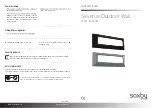
in which you can use the AvaLung effectively. If you are caught in an avalanche,
you risk dying as a result of trauma such as head injuries, spinal injuries,
crushing injuries, hitting trees or rocks, being buried so tightly that your chest
cannot expand or retract in order to breathe, being carried through a forest
or over rock or ice cliffs, hypothermia and other causes of death. Even if the
AvaLung mouthpiece is securely in your mouth at the onset of an avalanche,
the violence of an avalanche, reactive yelling or screaming or panic or a
combination of these may very well dislodge the mouthpiece. Without a secure
mouthpiece, and a firm seal, the AvaLung will not properly function to provide
you with an air supply if you are buried and otherwise survive the avalanche.
Even if you survive an avalanche or plunge into a tree well with the AvaLung
mouthpiece securely in place, you could die of hypothermia or asphyxiation
depending upon the amount of clothing you wear and how long your
recovery takes. The AvaLung will not protect you from injury or death
caused by trauma, hypothermia, misuse, poor judgment or other inherent
risks and dangers of avalanches, tree wells, deep snow and mountains. The
AvaLung cannot make prudent decisions for you and by itself cannot save
you if you are buried. If you are rendered unconscious, you may not be able
to properly utilize the AvaLung even if the mouthpiece is in your mouth.
The AvaLung will not clear debris should you vomit into it.
The AvaLung will
Not work underwater.
Respiration through the AvaLung in cold air can cause ice to form inside
the device’s tubing and housing. Ice buildup could potentially restrict
airflow or impede proper function of the valves. As a general rule, do not
use the AvaLung at temperatures colder than –20°C (-4° F). If you see or
suspect ice inside the AvaLung, clear the device by shaking most of the ice
out of the mouthpiece or by thawing the ice and shaking the water out of
each end of the unit. If the AvaLung becomes blocked by ice or the valves
do not function due to icing, it must be warmed and cleared before it can
be effective. If the user becomes buried by snow, temperatures within the
snowpack will be warmer than the air temperature especially once heat from
the user warms the surrounding snow. This may help reduce additional
icing problems and potentially even thaw the device, but only an AvaLung
which is functioning before burial can be relied on during a burial. Since
the AvaLung is a breathing assistance device, there is always the remote
possibility that respiratory diseases could be transmitted if you share or










































